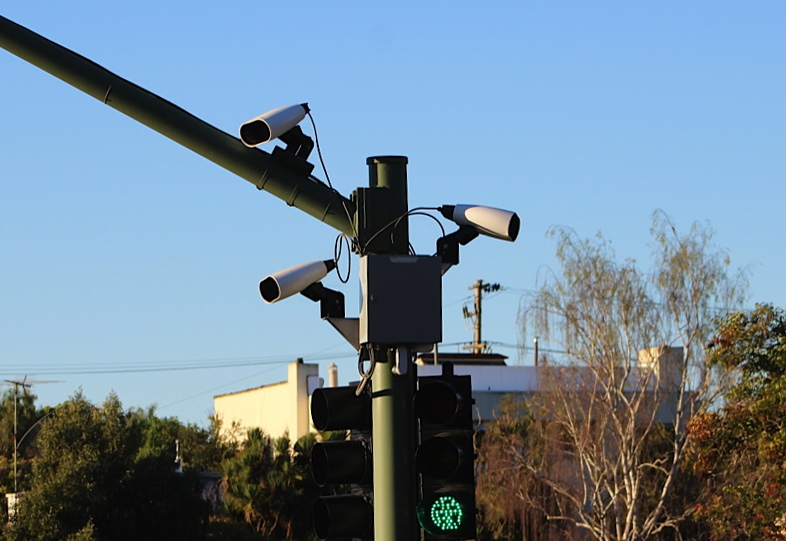Police officials say the cameras that record the license plate numbers of passing vehicles can provide information needed to help catch wanted crime suspects or help locate missing vehicles. Critics of these “automatic license plate reader” cameras, however, say they can be a sign of “overpolicing” of communities of color, and that the data they collect can be used for nefarious surveillance purposes.
But one thing supporters and critics of such security measures agree on is that the more open, the more transparent, police departments and local governments are about whatever surveillance systems are in use, the better.
“I think that public safety operates best when it has buy-in from all members of the community,” said Matthew Guariglia, a policy analyst with the San Francisco-based Electronic Frontier Foundation, Thursday night during a 90-minute Zoom panel discussion forum, “Reimagining Public Safety: Can Surveillance Be a Fair and Effective Tool?,” sponsored by the Piedmont Racial Equity Campaign, the Piedmont Anti-Racism and Diversity Committee and the League of Women Voters of Piedmont.
The benefits of ALPR cameras
Much of the discussion Thursday night centered on these ALPR cameras, 47 of which are in operation at 20 intersections and other entry points to Piedmont. Jeremy Bowers, Piedmont’s police chief and another forum panelist, said these cameras have directly led to more than 150 arrests since 2014. The cameras have also helped police find more than 250 stolen or missing vehicles, and have provided police in Piedmont and beyond with leads in hundreds of other cases.
ALPRs again prove their use in helping PPD track stolen vehicles and nab suspects — just last night. (Below from PPD’s Facebook page)
Our communities’ investment in ALPR cameras and our officer’s proactive police work paid off last night. A stolen car…
Posted by Piedmont Police Department on Friday, January 29, 2021
There has been some pushback to the city’s ALPR program, Bowers acknowledged, but the city has worked to make sure residents have been made aware of the city’s plans for the cameras, and of their ongoing use. He said he will speak about them again at Monday night’s Piedmont City Council meeting, where he is set to give his 2020 year-end police department report.
“Transparency is huge,” Bowers said Thursday night. “Our department is accessible, and our city is accessible to the public.”
The downsides of electronic surveillance tools
Others on Thursday night’s panel took a different view of ALPRs and other electronic surveillance tools. While Guariglia acknowledged Piedmont is a “geographical pecularity, in a way,” give that it’s completely surrounded by Oakland, Jennifer Jones — a technology and civil liberties fellow with the ACLU of Northern California — said such surveillance measures disproportionately impact communities of color and their outspoken champions.
Technology was used in the 1960s to gather intelligence on political organizations and individuals including Martin Luther King Jr. And in 2015, Jones said, facial recognition technology was used to help identify protesters after Freddie Gray died while in the custody of Baltimore police.
“Today, with the Black Lives Matter protests, we’re seeing a continuation of that historical pattern,” with more sophisticated tools, said Jones, who also asserted that mistakes made by ALPR cameras have resulted in “serious, life-threatening consequences for people of color.” She also said such surveillance methods don’t have a place in a democratic society.
Do Piedmonters understand the ramifications?
Panelist Brian Hofer, chairman of the Domain Awareness Center Ad Hoc Privacy Committee that worked to curtail the expansion of surveillance systems in Oakland, said ALPRs amount to “indiscriminate mass surveillance.” And he doesn’t necessarily believe Piedmont residents have gotten the full story about what these cameras can do.
“Most people don’t really understand how this works, and so never really gave consent,” said Hofer, joining some other panelists in saying these cameras and other surveillance methods are often used against certain groups of people. Even when cities like Piedmont host discussion of ALPRs at City Council meetings, 72 hours’ notice of such discussions, as called for under the Brown Act, isn’t necessarily enough time for people to educate themselves on issues like license plate cameras.
“Surveillance policies are typically adopted without getting political buy-in,” Hofer said.
Bowers said the information gathered by Piedmont’s ALPRs is stored for up to one year by the Northern California Regional Intelligence Center, operated by federal, state and local law enforcement agencies. The data is shared with other police agencies in the name of solving crimes. He said that if his city’s data was ever misused, his first reaction would be to take Piedmont’s information back.
“It’s critical that we have that legitimacy and trust, and that that information is properly managed,” Bowers said.
Contact Sam Richards at sam.richards4344@gmail.com
